
Call and Response: On Body Snarking and The Word “Tr*nny”
Introduction From The Editors [if you skip this, the article won’t make sense!]: We’re big fans of The Lingerie Addict, Cora Harrington‘s blog about — you guessed it — lingerie! — which just-so-happens to be the most popular lingerie blog in the whole entire world. Recently Cora, who is cisgender and often posts photo shoots of herself in lingerie on her blog, wrote a really thought-provoking post about her experiences being called a “tr*nny” online by cyber-harassers and the “unique issues mesomorphic (muscular) women deal with in the lingerie and fashion and beauty industries.” Cora also mentions that she’d love to hear a response to her piece from a transgender person or a companion piece on the same topic. So, after reading her (awesome) post, I thought, let’s republish this post and also make that response happen, and so I had my Executive Editor hit up Mey (short for Melínda), a queer trans* femme blogger who I’ve been following on tumblr. I love Mey’s writings about identity, beauty and body image, as well as the posts of her outfits, and I knew she would have a valuable perspective on the issues Cora raised in her post. Mey was on board for the assignment, obviously, and so today we have two essays for you — Cora’s original post, and Mey’s companion piece. We hope you like them both!
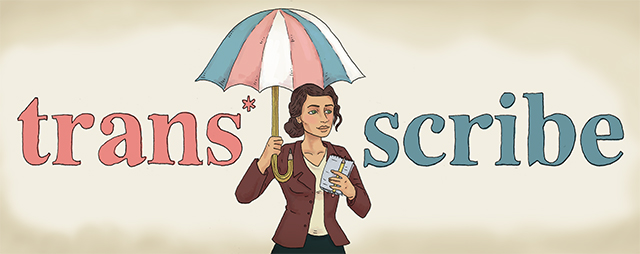
for more trans*scribe posts, click here
TW: Hate Speech

cora/treacle tart [photo by cheri pearl]
by Cora/Treacle Tart
Whether it’s your first time here or you’ve been a reader for years, I firmly believe that talking about lingerie doesn’t mean just talking about bras and panties. Lingerie is also an excellent lens to talk about other, important things that are happening in our world. Very often, these other conversations center around topics like body image or self esteem or beauty standards, and I very much see today’s blog post as a continuation of those discussions.
In the conversation on beauty standards within the lingerie industry, especially as related to body shape and size, there are usually only two sides represented: thinner women and thicker women. But women don’t just come in two sizes or or two shapes or two body types, and all the body celebration talk can start to feel a little exclusionary if you have a build that’s neither ectomorphic (thin) or endomorphic (thick). And as I was thinking about some of the unique issues mesomorphic (muscular) women deal with in the lingerie and fashion and beauty industries, I also began to think about some of the related (but by no means identical) issues transgender women face in the same spaces. And all this stuff has been percolating in my mind for the last few months, until I finally felt like I had to talk about it.
In the previous paragraph, I mentioned transgender women. I’m not a transgender woman. The gender I was assigned at birth and the gender people see me as is also the one I personally identify with. I’m aware that puts me in a privileged position, so I want to be clear that I’m not speaking for or on behalf of anyone. This is specifically an article about my personal experience with the word. However, I understand how difficult and delicate talking about these topics can be, and I hope this article serves as a spark for conversation within the comments section or even a guest post from someone within the transgender community. I’ve also tried to be as aware and careful as possible in the language I’m using (which does include some offensive/potentially triggering words), but if I’ve made a misstep, please do tell me. And of course it goes without saying that transphobic and/or homophobic remarks, of any kind, will not be tolerated here.
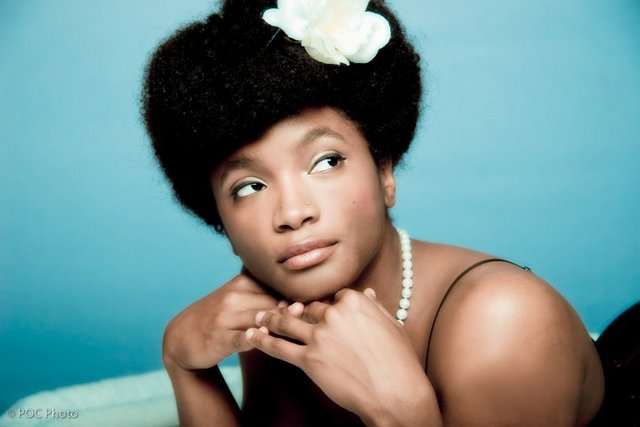
The first photo that elicited the slur. IMAGE VIA POC PHOTO
As many of you know, there are lots of photos of me online, usually in the pinup style. I have pretty stable self-esteem, so I’m not terribly bothered when people call me ugly or what have you. If I’m not your cuppa, great. But about a year ago, as TLA was starting to get a lot bigger, I noticed the beginnings of a strange new pattern. People started calling me a “tr*nny” in the comments of some my photos. Even now, as I’m typing this, my brows kind of furrow into a confused expression.
It’s not that I’m offended and appalled anyone would think I’m transgender (because, obviously, there’s nothing wrong with being transgender), it’s just that I’m a bit taken aback people would attempt to use gender identity as an insult. 1) How is being transgender a bad thing? 2) Why in the world are you still using those slurs?
But as it happened more and more (never what I’d call “frequently,” but often enough to take notice) and as The Lingerie Addict established itself as an anti-bullying environment, that whole thing got me thinking about body snark. One of the most offensive aspects of body snark is that it’s used to delegitimize women (as the popular phrase like “real women have curves” makes clear). Suddenly, instead of just being a woman, full stop, there are degrees of ‘real’ womanhood to aspire to. And if you don’t make the cut, then I suppose you’re a fake woman. Which is just weird. And silly. And wrong.
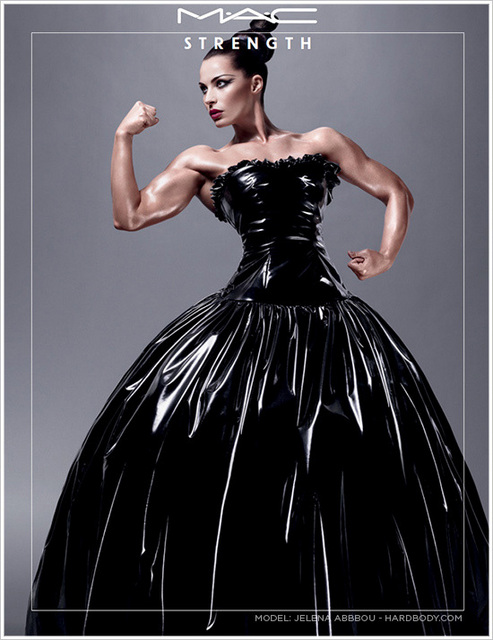
The MAC ad Samantha refers to in her piece. IMAGE VIA HARDBODY.COM
As I mentioned early on, the conversation on body snark is very often limited to just thin and thick women (the “skinny vs. curvy” thing) as though women only come in only those two body types and no more. That makes women with my kind of build (muscular/athletic), feel like the ‘odd chick out’ because it’s not only alienating, it also makes us invisible…which makes insulting us easier. And as highlighted in a Blisstree article by Samantha Escobar last year, muscular women face a very specific kind of body snarking, described in detail in the excerpt below:
We all know that our society often fat shames people they deem overweight and sometimes body shame those declared too thin, but many men and women consider very muscular women to be “gross” or “unappealing.” I find this strange, since — while I don’t remotely condone it — fat and thin shamers tend to at least cite health as a typical reason for being assholes. When it comes to insulting muscular females, this logic makes no sense; typically, those women work out frequently and eat incredibly well in order to achieve the bodies they have. Why insult them?
Well, it goes back to that “balance” thing regarding our bodies. We’re “allowed” to be strong and toned, but give us some solid definition, and bam — suddenly females are not “feminine” enough anymore. They’re constantly accused of doing steroids or being men, which is both absurd and insulting. On television, ultra-muscular women are typically cast as transgender (which is by no means a negative identity, but most muscular women were not born men; plus, television tends to insult the transgender community through most of these plot lines, as well).
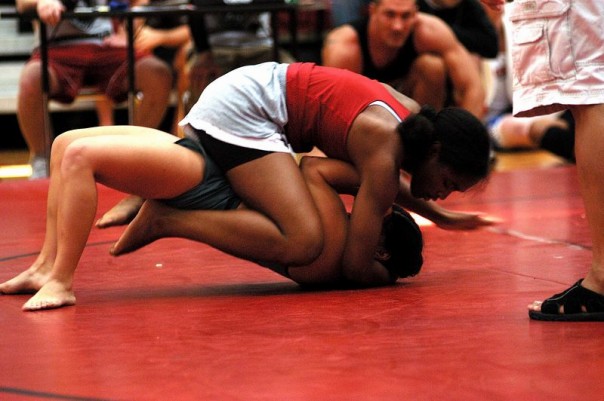
Way back when…
I definitely empathize with this Catch-22. In my past, pre-Lingerie Addict life, I was an avid martial artist, runner, and weight lifter. My particular body type allows me to build a lot of muscle very easily, and that also means I appear muscular and ‘in-shape’ with very little effort. I’m asked at least twice a week about my ‘killer arm routine’ when the honest truth is…I don’t have one. And I’ve had some very awkward conversations with guys saying they couldn’t date me because I was “too strong” and they were worried I’d “beat them up,” (as an aside, needing to have a partner that’s physically weaker than you is very interesting to me…but that’s a subject for another time).
What’s even more distressing is how often these claims of being “overly masculine” or “inappropriately muscular,” are also linked to race. While prepping this article, I spoke with a couple of models I know who are black, and they revealed that the “you look like a man” remark was unusually common for them as well…at least far more common than it was for white models they knew.
It’s like people are so confused/threatened when you don’t have an ideally feminine face or body or build, that it becomes open season on questioning your gender. It’s, in effect, saying “Your body is so unattractive to me that I have decided you don’t even count as a woman anymore. You are a fake woman. You are incorrect. And you need to conform.” Rest assured, it’s body snark, taken to a very ugly extreme. But that’s not the worst part of all this. My experiences with obnoxious gender policing aside, being called a “tr*nny” has made me think even more about how marginalized actual transgender people are.
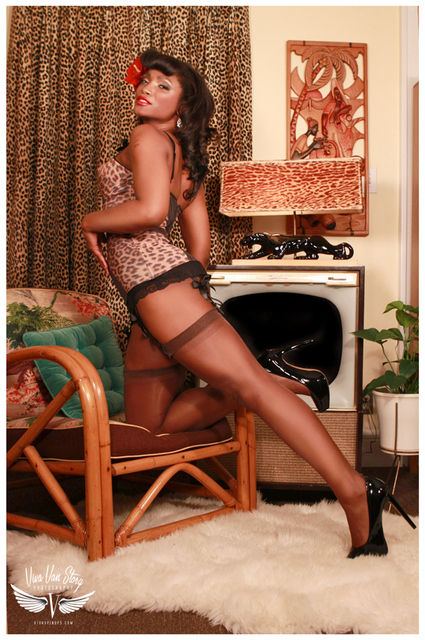
The second photo. IMAGE VIA Viva Van Story.
When someone calls me that, whether they’re attempting to be insulting or not, I’m able to say “no” and move along with my day, confident in the knowledge that the conversation is over. But I wonder…if I really was transgender and said “yes,” what would happen? And it’s not a pleasant question to think about when you consider the extreme and horrifying violence that transgender people (especially transgender women), face in our society.
If I was a transgender woman and out and publicly visible about my transgenderness, would people feel like they had the right to be awful towards to me? To insult me or harrass me or encourage violence against me? While these particular possibilities are mostly a thought experiment for me in this context, they are very real concerns for transgender people. And I can’t imagine what it must be like to constantly worry people will turn against you and want to hurt you (verbally, physically, or otherwise) over circumstances you literally have no control over.
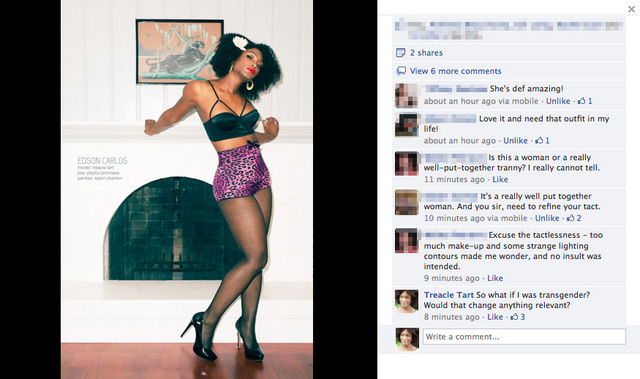
From my perspective, someone’s gender identity is their own personal business. Whatever’s happening below the neck has nothing to do with you. And asking if someone is transgender is not the kind of thing you casually inquire about via Facebook comment. Not all women are “thin” or “curvy.” Some of us are broad, muscular, powerful, athletic types. And if you do feel the need to ask if someone is transgender or not, first ask yourself why. Why is it your business? Why do you need to know? And will it change anything you think about this person? Finally, just avoid the word “tr*nny,” altogther (along with its analogues “shemale,” or “he/she”). Gender is more than your body shape, and one’s gender identity is not a slur. So let’s move past all that.
I know I’ve talked about a LOT of stuff in this article, so it’s definitely time for some conversation. What do you think about the snark against women with muscular body types? How do you feel when someone uses the words mentioned above as an insult? And have you ever personally encountered any of the things I’m talking about here? I’m looking forward to chatting in the comments.
About the Author: Cora Harrington is a 20-something knickers junkie and Seattle resident who started The Lingerie Addict because her friends were tired of listening to her talk about her lingerie. She also loves fruit roll-ups, makeup, costume jewelry, and comic books… though not necessarily in that order. Follow her on twitter.
.
Tr*nny Means Someone Who Isn’t Accepted As A Woman

mey
by Melínda
The internet seems to be very confused about whether or not “tr*nny” is a slur, and even what it really means. Pop stars and members of the queer community use it as though it’s a harmless word that belongs to them.
We have Lady Gaga saying, “I just don’t feel that it’s all that sexy. It’s weird. And uncomfortable. I look at photos of myself, and I look like such a tr*nny!”
Katy Perry added that “I mean, I can’t be a full tr*nny every day of the week. That’s an exaggerated part of my personality. It’s me hamming it up.”
Ke$ha chimed in with “Freaks are what make everything mildly more interesting in life but with tr*nnies, they make me want to be a better woman.”
Perhaps most often, it’s used by website commenters when they disagree with the way a woman presents herself. But first of all, let me clear one thing up. That word is not just an innocent shortening of the word transgender. It’s not a term of endearment. It’s not a word that queer men or cis women should use to greet their friends. It’s a slur. It’s a derogatory term used specifically against trans women to try to put us down and take away our womanhood.
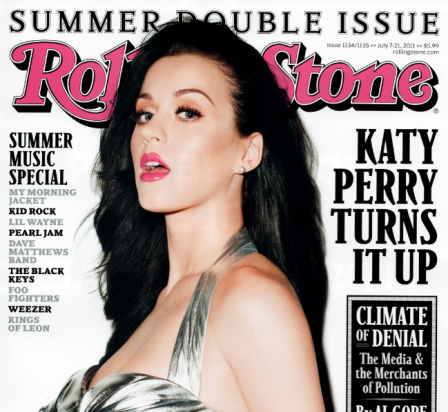
Online, the place I mostly see the word tr*nny isn’t in people spewing hate and saying that trans women deserve to burn in hell or should die. I mean, sure, there is definitely some of that, but I usually see it used as a way of insulting the way women (whether they are trans or cis) look. Whether it’s our fashion choices, our makeup, our height, our weight or our skin, everything is apparently up for grabs. It’s used if you’re too tall, if you have small boobs, if you have broad shoulders, a strong jaw, big hands, a short haircut, too little makeup, too much makeup, too many colors, too many sequins. If you think she’s too masculine, she doesn’t “pass” as a woman in your book and you can use the slur. If you think she’s too feminine, she’s just “performing” womanhood and you can use the slur. Either way, women are judged on how well we fit into a narrow and ridiculous idea of what femininity should be.
As a trans woman, not many things give me a headache the way the entire concept of passing does. Passing is the idea that if a trans woman (or any person who is presenting as a woman) looks, dresses and acts a certain way, people won’t be able to tell they are anything other than a completely “normal” woman. If you look at online trans communities or forums, you’ll find tons of tips on how to pass better – everything from hair removal tips to workouts to how to walk and sit more femininely.
All of this presupposes that there is only one right way to look like and be a woman. And it’s infuriating. On the one hand, whenever I go out in public or post pictures online, a part of me is deathly afraid that I’ll be insulted or worse. I desperately want to be accepted as the woman I am. On the other hand, I hate that in order to feel safe, I’m expected to fit into the very narrow box that is labeled “woman.” Tips on how to pass always seem to say that you should avoid building muscle mass and avoid wearing clothes and makeup that are too costumey, that you should try to hide your shoulders and soften your features. Trans women are often told that if we want to pass, we have to try our hardest to be petite, soft, have just the right amount of femininity, and not stand out too much. But what if I want to be a different kind of woman? What if I want to look like Grace Jones or Kate Moennig? What if I want to look like Beth Ditto or Dolly Parton? They’re all cis women; don’t they pass?
This is where the entire idea should fall apart. This is where people should realize that women can have muscles or fat or be masculine or wear outrageous makeup or wigs and still be women. But many people haven’t caught on. Instead of seeing diverse women and realizing that it’s okay to be a fat or tall or muscular or skinny or whatever-else-you-want-to-be woman, they cling to their outdated ideals and just start calling cis women “tr*nnies” if they don’t look “feminine” enough. Now, this isn’t really an insult, as being trans isn’t a bad thing. But people still try to use it as one. And for cis women, this must be strange.
In her article for The Lingerie Addict, Treacle addresses this by asking, “When someone calls me that, whether they’re attempting to be insulting or not, I’m able to say ‘no’ and move along with my day… But I wonder… if I really was transgender and said ‘yes,’ what would happen?” There are a lot of answers to this question.
In a worst case scenario, it can be deadly. A frighteningly large number of people think that it’s acceptable to beat or murder a woman because she’s trans, especially if she’s also of color. Having your transness be visible is seen as an open invitation for scorn and even violence. Since they attempted to “trick” you or “trap” you (another slur that really needs to be put to rest), and since they are a tr*nny and not a woman, it is somehow acceptable to hit them. Other times, it means that people will simply stop seeing you as a woman. They will forever see you as a tr*nny, or if you’re lucky, a “transgender.” In a best case scenario, you say “yes” and try to move on. You know that there is absolutely nothing wrong with being trans and that they aren’t telling you anything you don’t know or haven’t heard before. They’re trying to insult you, but they are failing. Because in the end they’re just showing that they are so ignorant or foolish that they think they can take a part of your identity and use it as a slur.
Even owning transness as part of your identity doesn’t mean you can forget the connotation of the word in question, though. “Tr*nny” doesn’t just mean someone who is trans, it means someone who isn’t accepted as a woman. The word turns trans women into the “other.” By taking away our womanhood, by saying, “is this a woman or a really well-put-together tr*nny?” like the commenter does in the picture that goes with The Lingerie Addict’s article, they are saying that the two are distinct and separate categories. They are saying that I can’t be both. Furthermore, if you have to specify “really well-put-together,” you are implying that most are not. They are comparing a beautiful woman to me and saying that if she were like me, that wouldn’t be a good thing and that she would be less of a woman. They are saying that there is something wrong and insulting about a fundamental part of who I am. And that hurts.
These slurs are far from the only problem trans women face when it comes to being judged by online commenters, though. There’s another type of body snark, one that at first seems a lot less harmful. It happens when trans women post pictures of themselves and get comments from people saying things like “I never would have guessed you were trans!” or “You pass so well!” or worst of all “You don’t look trans at all!” These people are trying to compliment us, but really they’re saying that “looking trans” is a bad thing. They’re saying that looking like this thing that I am is something I should strive to avoid. They’re saying that there is one way to look trans, and that it’s undesirable. But I know trans women who range from 5’3″ to 6’6″, from a size zero to a size 28. I know trans women who are as femme as all get out and I know trans women who are as butch as they come. There is no one look that describes trans women. Just because a trans woman has less muscle or more hair or narrow shoulders or wide hips, that doesn’t make her any more of a woman. All trans women are women. Each is as real as the next.
When someone online calls you ugly or says that you have terrible taste, that’s subjective. You can try and brush it off as just their foolish, and wrong, opinion. But when someone calls you a tr*nny, and you are trans, in a way, they’re right. You are transgender. And they are using that part of your identity, that thing that is a part of you that you have no control over, in an attempt to drag you down. They are trying to say that your womanhood isn’t as valid as someone else’s. They’re wrong, but it still hurts. Even when they use the word to try and insult or criticize cis women it still hurts. A part of who you are is used as a word to delegitimize women. They might not be attacking you directly, but it certainly is a microaggression. It seeps all throughout internet culture and casually tries to reinforce the idea that trans women are not “real women” and that women who don’t fit strictly conventional beauty standards are not doing womanhood correctly. It hurts all women and especially hurts women who are already oppressed. It works to try to force all of us into narrow definitions of womanhood and femininity and it needs to stop.
About the author: Mey (short for Melínda) is a 26 year old queer trans Latina who lives in Idaho with her cat Sawyer. She loves scifi, fantasy, horror and comic books. Her hobbies include reading books and watching movies, going to concerts and being a comedy nerd. She’s afraid of heights, airplanes and whales.
“When Body Snark Becomes Even Uglier…” was originally published on thelingerieaddict.com. Republished WITH PERMISSION MOTHERF*CKERS.
Special Note: Autostraddle’s “First Person” personal essays do not necessarily reflect the ideals of Autostraddle or its editors, nor do any First Person writers intend to speak on behalf of anyone other than themselves. First Person writers are simply speaking honestly from their own hearts.
